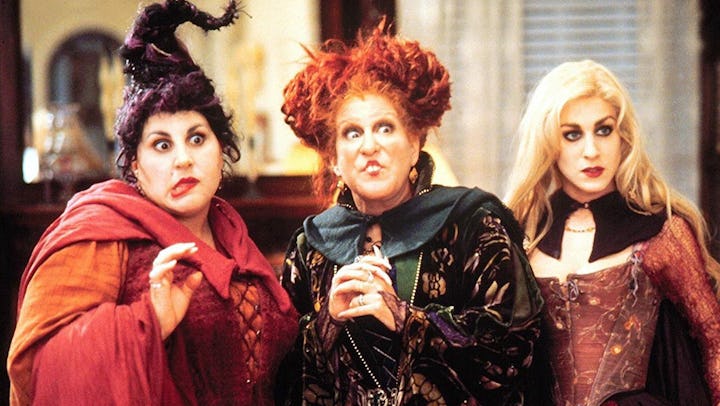30 Years Later, Hocus Pocus Is Still A Bad Movie That We Pretend Is Good
No enough witches in the summer witch movie.

Spooky movies benefit from the Halloween season lasting at least two months; most of September and all of October. But back in 1993, Halloween season began on July 16. Thirty years ago, the cult-favorite Halloween Hocus Pocus hit theaters and became a thing that people you know talk about constantly. The perplexing summer release of Hocus Pocus was likely designed to capitalize on children being on summer vacation or something. Perhaps non-coincidentally, it underperformed at the box office.
But, where summer was unkind to Hocus Pocus, Halloween proved its salvation. The movie became a cult classic thanks to constant airings on the Disney Channel throughout various Octobers. The Disney Channel’s target audience is of course children. That means that multiple generations encountered Hocus Pocus when they were but tots and consequently at a pre-critical age in their emotional and intellectual development.
None of this means that Hocus Pocus is a particularly good movie. In fact, it’s a bad one. So how did it become so beloved? In a word, kids.
Early fans were inclined to like Hocus Pocus not because it’s good but rather because it’s a movie for kids and children are undiscriminating. They’ll watch pretty much anything. That is particularly true of scary stuff during the weeks and months leading up to Halloween and for thirty years now Hocus Pocus has been extremely available. Enough people have chosen Hocus Pocus through the decades that three decades after receiving mixed to negative reviews and sub-par box-office a high-profile sequel dropped on Disney+ in 2022. This movie is better than the original because more thought was put into it than whatever was going on with the first one. Also, Sam Richardson is in it, and who doesn’t love Sam Richardson?
It’s hard to overstate the role nostalgia plays in convincing people who should probably know better that flimsy, clattering contraptions like Hocus Pocus are timeless classics that must be passed onto our children as a sacred American ritual. Hocus Pocus has, alas, become a cherished piece of spooky season Americana without being particularly good. It is celebrated primarily for the outsized performances of stars Bette Midler, Sarah Jessica Parker, and Kathy Najimi as sisters Winnifred, Sarah, and Mary Sanderson respectively, centuries-old witches running amok in modern-day Salem. In fairness, Midler, Parker, and Najimy’s performances hold up. They’re everything that our society angrily insists women should not be: ugly, aggressive, cocky, rapacious, devoid of maternal instincts but obsessed with draining the life force of children. This all works.
But the thing that hasn’t aged that well about Hocus Pocus is the fact that the Sandersons — the most Hocus Pocus-y part of the movie — are actually pushed into the background in order to focus on the snooze-inducing story of a cute boy from California who moves East with his family and must overcome his indifference about Halloween to pursue the girl of his dreams. Leonardo DiCaprio was originally offered the role of Max, a California kid out of water in Salem, Massachusetts but wisely declined in favor of his career-making, Oscar-nominated turn in What’s Eating Gilbert Grape.
Most of the movie is actually about this guy.
Omri Katz ended up playing the male lead, a bland hunk who develops a crush on classmate Allison Watts (Vinessa Shaw). As Max’s annoying little sister Dani (Thora Burch) informs an inexplicably charmed Allison, her brother refers to breasts as “Yabbos” and thinks the object of her brother’s affection has a particularly lovely pair. Dani is gratingly precocious even by child star standards but inspires a consistent stream of chuckles in a gloriously mean-spirited running gag where she can’t help but inform everyone that she meets that her brother is a virgin. None of this started well let alone aged well and all of it is very cringey. These elements also occupy much more of the movie’s runtime than the witches who are supposedly the movie’s stars
Max, Dani, Allison, and a strangely forgettable talking cat inhabited by the cursed soul of someone who tangled with the Sanderson sisters back in the seventeenth century must then stop the witches from growing more and more powerful by taking the ineffable essence of Salem’s children.
Throughout, Midler embodies and personifies camp, but then again, for young children who saw the movie in 1993, this was probably their first experience with camp. She has never been campier or more theatrical than she is in Hocus Pocus. That’s another aspect of the film’s enduring cult. It’s an early gateway to camp and horror at the same time. In terms of look, aesthetic, and attitude, Midler, Parker, and Najimy come closer to John Waters-esque divas than traditional Disney witches.
This campy bigness and unapologetic nastiness of the star performances is Hocus Pocus’ greatest strength. And it’s the most forgivable key to its enduring popularity. Without it, Hocus Pocus would feel like a Disney Channel original movie rather than a generously budgeted theatrical feature film that became popular through the Disney Channel. Again, because the sequel exists as an outgrowth of nostalgia, Hocus Pocus 2 is already cleared an already very low bar. In fact, because Hocus Pocus 2 is halfway watchable it created an odd feedback loop in which the original is elevated in more than it is already.
Still, the betterness of Hocus Pocus 2 can’t erase the creepy teen-sexualized aspects of the original. When it comes to movies, childhood, and nostalgia, quality is just one factor to consider when determining a movie’s ultimate worth and not even a particularly important one. Hocus Pocus may have cast a magical spell on our good sense over the years, but all that witchcraft can’t change the facts: the story of Hocus Pocus is mostly mumbo jumbo.
Both Hocus Pocuses stream on Disney+.
This article was originally published on